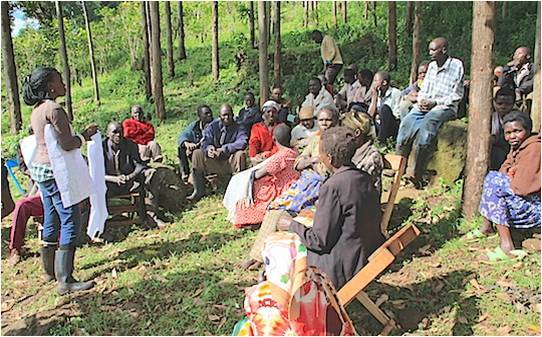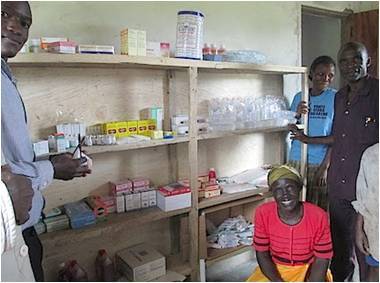Guest post by Aliya Mughal, freelance journalist, on behalf of Spark MicroGrants
What's the point of development when the majority of people in Sub-Saharan Africa continue to live in poverty despite $54 billion being pumped into the region through official development assistance?
That's the bold question to be posed at a Social Entrepreneurship Networking event taking place on March 13 in Kampala, by a group of NGO experts who are enabling the most impoverished communities to create meaningful change through partnerships with them to find the answer.
The networking event, co-sponsored by the Segal Family Foundation, One Acre Fund, and Unreasonable East, will feature a panel discussion on "Bottom-up Social Entrepreneurship - Community-Led Models for Development". The panel will explore whether social entrepreneurship is a top-down sector and identify ways to create an inclusive entrepreneurship movement.
Whereas the traditional aid model sees external agencies determining the problems and imposing the answers, the bottom-up approach (or locally-led development) is reversing this model, so that external advisors are no longer the sole agents of change.
The bottom-up approach recognizes that communities living in poverty can solve the problems they face, when given the support to do so, whether that's creating new public infrastructures to strengthen economic activity, or facilitating social businesses that generate income for communal needs. "No longer are community members passive beneficiaries but active change makers of their own destiny and development," says Daniela Gusman, Spark Microgrants Uganda Country Director.
Spark MicroGrants is part of a growing movement of nongovernment organizations that is leveraging this development model to engage community members in the planning and implementation process of social impact projects. The fundamental ethos of Spark's model of Community Development Experience (CDE) is to foster social cohesion and civic engagement from within, through a real-time experience that enables each community to continue leading local change.

To date, Spark has partnered with over 75 communities and positively impacted the lives of 64,000 people in Uganda, Rwanda and Burundi, to design and implement projects such as schools, cooperative farming initiatives and health centers to name but a few. But the real measure of success is the way in which those communities utilize the skills and knowledge they learn about leadership, advocacy, democracy, female empowerment, project planning and financial management.
As a community member from Bunatsoma, a remote rural community in Uganda's mountainous-region, put it: "As a community, we have been able to identify our goal which is developing our village. As a person, I believe I am empowered and confident of myself due to my continuous participation in the [Spark] meetings."
By implementing this development approach, many communities have gone on to independently develop other projects - clear proof that self determination is the sustainable route to creating long term practical, humanitarian change.
It's a desperately needed approach given the alarming disparity between the net total spent by donor countries on official development assistance and the measurable impacts.
According to the most recent Official Development Assistance (ODA) data compiled by the Organisation for Economic Cooperation Development (OECD), the total annual aid spending in Uganda last year was $1.5 billion, compared to $1.3 billion in Rwanda and $577 million in Burundi. That aid includes cash, aid-in-kind, mixed projects, global public good and money transferred to international NGOs.
Yet 38% people still live in poverty in Uganda, 63% in Rwanda and 81% in Burundi, according to the World Bank. And those are only the recorded figures; the people living on the fringes of society are excluded in every sense of the word.
"We live in a world where billions of people cannot meet their most basic needs such as accessing education, food and health care, despite billions of dollars spent to assist them," says Sasha Fisher, Executive Director of Spark. "Aid organizations control development in impoverished regions while local communities are forced to sit on the sidelines of designing their own futures. In our view, in order to address humanity's most pressing problems, we must instead locate communities as the primary actor."
The key to the success of the locally-led approach is a relationship built on trust, not power. Spark recruits local university graduates as facilitators in their respective countries. They scout out the most vulnerable communities who are then assisted in identifying their critical needs through a structured facilitation process over a period of five months. Elected community leaders are then advised on how to lead the process of preparing a project plan, designing and implementing a strategy, and managing a budget awarded by Spark to the tune of up to $10,000.

East Africa doesn't have to be defined by memories of violence, genocide, conflict and poverty - although there's no denying that's part of their history. The point is to look forward, with "positive deviation", a philosophy utilized by Spark, which is injecting fresh thinking into the development sector.
It's a process that is indisputably helping countries like Uganda, Rwanda and Burundi redefine their identities from within, and countering the predominant outsider view of nations in slow recovery from the scars of war, genocide and conflict.
"What's the point of development? The answer starts and ends with the people who drive our work and who should therefore be involved in shaping it," says Katie Hatch, Spark Microgrants Development Director. "We really want to catalyze and share our ideas to bring everyone together to create sustainable change; that includes everyone in the development sector and the people on the ground.
"The more that we share and the more that we're open to collaboration, the greater the impact and the greater the outcomes."
For more information on Spark Microgrants, please visit http://www.sparkmicrogrants.org.